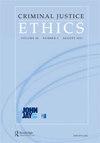The Limits of Reallocative and Algorithmic Policing
Q2 Social Sciences
引用次数: 1
Abstract
Policing in many parts of the world—the United States in particular—has embraced an archetypal model: a conception of the police based on the tenets of individuated archetypes, such as the heroic police “warrior” or “guardian.” Such policing has in part motivated moves to (1) a reallocative model: reallocating societal resources such that the police are no longer needed in society (defunding and abolishing) because reform strategies cannot fix the way societal problems become manifest in (archetypal) policing; and (2) an algorithmic model: subsuming policing into technocratic judgements encoded in algorithms through strategies such as predictive policing (mitigating archetypal bias). This paper begins by considering the normative basis of the relationship between political community and policing. It then examines the justification of reallocative and algorithmic models in light of the relationship between political community and police. Given commitments to the depth and distribution of security—and proscriptions against dehumanizing strategies—the paper concludes that a nonideal-theory priority rule promoting respect for personhood (manifest in community and dignity-promoting policing strategies) is a necessary condition for the justification of the above models.再分配和算法监管的局限性
世界上许多地方的警务工作,尤其是美国,已经接受了一种原型模式:一种基于个性化原型原则的警察概念,比如英雄般的警察“战士”或“守护者”。这种警务在一定程度上推动了以下举措:(1)重新分配模式:重新分配社会资源,这样社会就不再需要警察了(撤资和废除),因为改革战略无法解决社会问题在(原型)警务中显现的方式;(2)算法模型:通过预测性警务(减轻原型偏见)等策略,将警务纳入算法编码的技术官僚判断。本文首先考虑政治共同体与警务关系的规范基础。然后,根据政治社区和警察之间的关系,检查重新分配和算法模型的合理性。鉴于对安全的深度和分布的承诺,以及对非人性化策略的禁止,本文得出结论,促进对人格的尊重的非理想理论优先规则(体现在促进社区和尊严的警务策略中)是上述模型正当化的必要条件。
本文章由计算机程序翻译,如有差异,请以英文原文为准。
求助全文
约1分钟内获得全文
求助全文

 求助内容:
求助内容: 应助结果提醒方式:
应助结果提醒方式:


